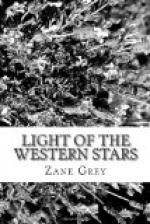“Wal, you might be too damn considerate of Miss Hammond’s sensitive feelin’s.” There was now no trace of the courteous, kindly old rancher. He looked harder than stone. “How about my feelin’s? I want to know if you’re goin’ to let this sneakin’ coyote, this last gasp of the old rum-guzzlin’ frontier sheriffs, put you in irons an’ hawg-tie you an’ drive you off to jail?”
“Yes,” replied Stewart, steadily.
“Wal, by Gawd! You, Gene Stewart! What’s come over you? Why, man, go in the house, an’ I’ll ’tend to this feller. Then to-morrow you can ride in an’ give yourself up like a gentleman.”
“No. I’ll go. Thanks, Bill, for the way you and the boys would stick to me. Hurry, Hawe, before my mind changes.”
His voice broke at the last, betraying the wonderful control he had kept over his passions. As he ceased speaking he seemed suddenly to become spiritless. He dropped his head.
Madeline saw in him then a semblance to the hopeless, shamed Stewart of earlier days. The vague riot in her breast leaped into conscious fury—a woman’s passionate repudiation of Stewart’s broken spirit. It was not that she would have him be a lawbreaker; it was that she could not bear to see him deny his manhood. Once she had entreated him to become her kind of a cowboy—a man in whom reason tempered passion. She had let him see how painful and shocking any violence was to her. And the idea had obsessed him, softened him, had grown like a stultifying lichen upon his will, had shorn him of a wild, bold spirit she now strangely longed to see him feel. When the man Sneed came forward, jingling the iron fetters, Madeline’s blood turned to fire. She would have forgiven Stewart then for lapsing into the kind of cowboy it had been her blind and sickly sentiment to abhor. This was a man’s West—a man’s game. What right had a woman reared in a softer mold to use her beauty and her influence to change a man who was bold and free and strong? At that moment, with her blood hot and racing, she would have gloried in the violence which she had so deplored: she would have welcomed the action that had characterized Stewart’s treatment of Don Carlos; she had in her the sudden dawning temper of a woman who had been assimilating the life and nature around her and who would not have turned her eyes away from a harsh and bloody deed.
But Stewart held forth his hands to be manacled. Then Madeline heard her own voice burst out in a ringing, imperious “Wait!”
In the time it took her to make the few steps to the edge of the porch, facing the men, she not only felt her anger and justice and pride summoning forces to her command, but there was something else calling—a deep, passionate, mysterious thing not born of the moment.
Sneed dropped the manacles. Stewart’s face took on a chalky whiteness. Hawe, in a slow, stupid embarrassment beyond his control, removed his sombrero in a respect that seemed wrenched from him.




